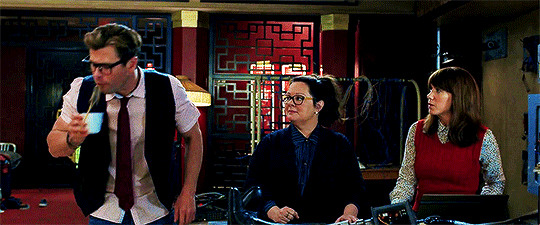In the year 2016 the newspaper–not that there is a newspaper–asks you “what kind of fat are you?” There has not been an invasion of lipid-based life forms; you are a fat; I am a fat; we are all fats. Every fat’s story is one of redemption from fat. The newspaper says there are three kinds of fat: skinny fat, burn-out fat, and stress fat. The life of every fat is a kind of time travel, each year landing on each fat too early or too late. Chronology awaits its correct subjects who are nonetheless already so irredeemably othrodox that they imagine they are not.
In 2016 by appearance I am a skinny fat. I feel the visceral fat wrapped around my heart. A skinny fat is fine but lesser, someone who lives as shallowly as she breathes. She does little and eats little. Her whole body is atrophying. Fat clings to her vital organs, keeping her from freezing, keeping her muddled. The redeemed fat is Chris Hemsworth as a dumb secretary: all muscle.
But, feeling the 11 AM thrum of caffeine and no breakfast, every day I am a burn-out fat, every day I am a stress fat. I am exhausted by the not-newspaper and I am exhausted by 2016, yet its trinity of fats buzzes around and slaps the windows of my mind. I am so exhausted I eat breakfast, and breakfast, like ballast, makes me want to sink back into bed.
Though this not-newspaper is unreconstructed, I am uncertain what the difference between chocolate bars whose packaging is crammed with nouns repurposed as adjectives attempting to exempt them from capitalism, and American television. The last three years, the Interstate here has been under construction. This 15-mile stretch has late-night road crews, closed lanes, lowered speed limits, and one exit that is such a labyrinth I take any other route to avoid it. The construction is exciting for the future, and exhausting for its duration. Eventually, there will be another period during which nothing much happens to the Interstate, and then it will become exhausted.
I come home with bags of groceries, ingredients to dishes that I was excited to make. I collapse onto the couch and eat an entire chocolate bar, the wrapper of which assures me the farmers who grew the chocolate were never unhappy. I open another bar, which was on sale. It purports to end slavery.
As the theobromine works its way into my brain, I realize that I don’t understand what a burn-out fat or a stress fat is. At the times in my life when I over-ate to the point of constant indigestion, I did so out of anxiety. It was not a mysterious psychological mechanism. I was anxious that I would not be able to have enough energy for the long, stressful work days, so I wanted to top myself off. I thought I needed a reserve to cope with an uncertain future. At night I ate even more, to recover what I thought I had lost during the day.
Dumb Chris Hemsworth needs to be dumb because muscle offers no protection. There are two kinds of film in 2016: Fun, intensely referential reboots, and serious reboots that tell The Real Story. The villain in a film in the first category is a caricature of a depressive man (a burn-out fat?) who sees the world as “garbage” because it does not echo his suffering back to him. He steals and then discards Dumb Chris Hemsworth’s body because it was making him dumb, which is to say it, like the Ghostbusters themselves, pokes holes in his depressive realism. Dumb Chris Hemsworth isn’t so much dumb as a determined malapropist. He mixes up words as well as objects and their qualities. The fake phone in the aquarium looks to him like he needs to answer it, but he never answers the real phone. To the melancholic, this is unacceptable. It is hard not to think that Ghostbusters, both old and new, is hostile to historicism. Maybe that’s what makes it fun.

2016 is a year of crying in comedies for me. Not because the comedies (Absolutely Fabulous, Ghostbusters) are bad, but because the jokes brush away my habitual distractions, and then there are lulls between jokes. In most groups I am a Holtzmann, relying on others to be responsible and to define a continuity that I am left to observe and comment upon at my leisure. The expansiveness of her relation to time allows her to be laconic. Her jokes are burn-out jokes. Both she and the villain are destructive geniuses, but where he wants to blow up the world because it’s not up to his standards, she is a nihilist who delights in blowing shit up in general. His energy, as well as his dissatisfaction, comes from his retentiveness. His laboratory is filled with ghosts trapped in picture frames, whereas the Ghostbusters catch one ghost and release it in the next scene. As a scientist, Holtzmann is an omnivore; she is exhaustion turned inside-out. Everything is meaningless, so she “actualizes” every idea that occurs to her, which perhaps explains the Makers persistance into 2016, so tiring just to consider.